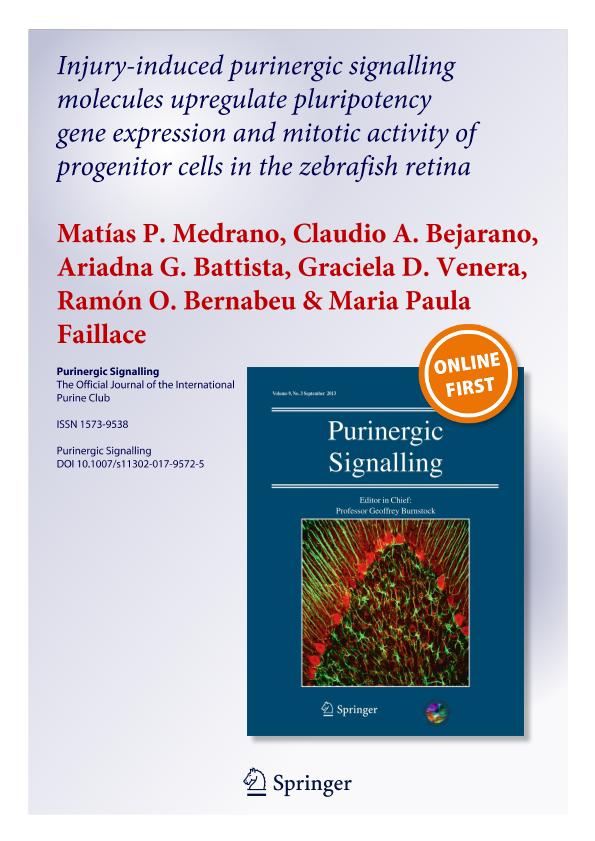Artículo
Injury-induced purinergic signalling molecules upregulate pluripotency gene expression and mitotic activity of progenitor cells in the zebrafish retina
Medrano, Matias ; Bejarano, Claudio Alejandro
; Bejarano, Claudio Alejandro ; Battista, Ariadna Gabriela
; Battista, Ariadna Gabriela ; Venera, Graciela Delia
; Venera, Graciela Delia ; Bernabeu, Ramon Oscar
; Bernabeu, Ramon Oscar ; Faillace, Maria Paula
; Faillace, Maria Paula
 ; Bejarano, Claudio Alejandro
; Bejarano, Claudio Alejandro ; Battista, Ariadna Gabriela
; Battista, Ariadna Gabriela ; Venera, Graciela Delia
; Venera, Graciela Delia ; Bernabeu, Ramon Oscar
; Bernabeu, Ramon Oscar ; Faillace, Maria Paula
; Faillace, Maria Paula
Fecha de publicación:
07/2017
Editorial:
Springer
Revista:
Purinergic Signalling
ISSN:
1573-9538
e-ISSN:
1573-9546
Idioma:
Inglés
Tipo de recurso:
Artículo publicado
Clasificación temática:
Resumen
Damage in fish activates retina repair that restores sight. The purinergic signalling system serves multiple homeostatic functions and has been implicated in cell cycle control of progenitor cells in the developing retina. We examined whether changes in the expression of purinergic molecules were instrumental in the proliferative phase after injury of adult zebrafish retinas with ouabain. P2RY1 messenger RNA (mRNA) increased early after injury and showed maximal levels at the time of peak progenitor cell proliferation. Extracellular nucleotides, mainly ADP, regulate P2RY1 transcriptional and protein expression. The injury-induced upregulation of P2RY1 is mediated by an autoregulated mechanism. After injury, the transcriptional expression of ecto-nucleotidases and ecto-ATPases also increased and ecto-ATPase activity inhibitors decreased Müller glia-derived progenitor cell amplification. Inhibition of P2RY1 endogenous activation prevented progenitor cell proliferation at two intervals after injury: one in which progenitor Müller glia mitotically activates and the second one in which Müller glia-derived progenitor cells amplify. ADPβS induced the expression of lin28a and ascl1a genes in mature regions of uninjured retinas. The expression of these genes, which regulate multipotent Müller glia reprogramming, was significantly inhibited by blocking the endogenous activation of P2RY1 early after injury. We consistently observed that the number of glial fibrillary acidic protein-BrdU-positive Müller cells after injury was larger in the absence than in the presence of the P2RY1 antagonist. Ecto-ATPase activity inhibitors or P2RY1-specific antagonists did not modify apoptotic cell death at the time of peak progenitor cell proliferation. The results suggested that ouabain injury upregulates specific purinergic signals which stimulates multipotent progenitor cell response.
Palabras clave:
E-Ntpdases
,
Extracellular Nucleotides
,
Pluripotency Genes
,
Progenitor Cell
Archivos asociados
Licencia
Identificadores
Colecciones
Articulos(IBBEA)
Articulos de INSTITUTO DE BIODIVERSIDAD Y BIOLOGIA EXPERIMENTAL Y APLICADA
Articulos de INSTITUTO DE BIODIVERSIDAD Y BIOLOGIA EXPERIMENTAL Y APLICADA
Articulos(IFIBIO HOUSSAY)
Articulos de INSTITUTO DE FISIOLOGIA Y BIOFISICA BERNARDO HOUSSAY
Articulos de INSTITUTO DE FISIOLOGIA Y BIOFISICA BERNARDO HOUSSAY
Articulos(IQUIFIB)
Articulos de INST.DE QUIMICA Y FISICO-QUIMICA BIOLOGICAS "PROF. ALEJANDRO C. PALADINI"
Articulos de INST.DE QUIMICA Y FISICO-QUIMICA BIOLOGICAS "PROF. ALEJANDRO C. PALADINI"
Citación
Medrano, Matias; Bejarano, Claudio Alejandro; Battista, Ariadna Gabriela; Venera, Graciela Delia; Bernabeu, Ramon Oscar; et al.; Injury-induced purinergic signalling molecules upregulate pluripotency gene expression and mitotic activity of progenitor cells in the zebrafish retina; Springer; Purinergic Signalling; 13; 4; 7-2017; 443-465
Compartir
Altmétricas



